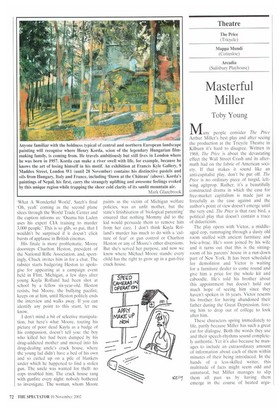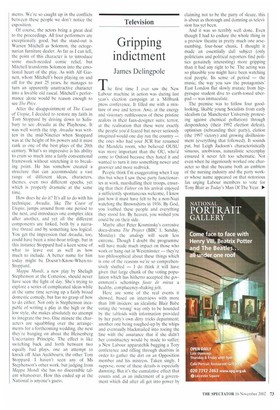The Price (Tricycle) Mappa Mundi (Cottesloe) Arcadia (Salisbury Playhouse)
Masterful Miller
Toby Young
Many people consider The Price Arthur Miller's best play and after seeing the production at the Tricycle Theatre in Kilburn it's hard to disagree. Written in 1968, The Price is about the devastating effect the Wall Street Crash and its aftermath had on the fabric of American society. If that makes it sound like an anti-capitalist play, don't be put off. The Price is no ordinary piece of turgid, leftwing agitprop. Rather, it's a beautifully constructed drama in which the case for free-market capitalism is made just as forcefully as the case against and the author's point of view doesn't emerge until the very end. The Price is that rare bird, a political play that doesn't contain a trace of didacticism.
The play opens with Victor, a middleaged cop, rummaging through a dusty old room stuffed with ancient furniture and bric-a-brac. He's soon joined by his wife and it turns out that this is the sittingroom of his parents' house in a run-down part of New York. It has been scheduled for demolition and Victor is waiting for a furniture dealer to come round and give him a price for the whole kit and caboodle. He's told his brother about this appointment but doesn't hold out much hope of seeing him since they haven't spoken in 16 years. Victor resents his brother for having abandoned their father during the Great Depression, forcing him to drop out of college to look after him.
These characters spring immediately to life, partly because Miller has such a great ear for dialogue. Both the words they use and their speech-rhythms sound completely authentic. Yet it's also because he manages to include an extraordinary amount of information about each of them within minutes of their being introduced. In the hands of a less-skilled writer, this multitude of facts might seem odd and unnatural, but Miller manages to slip them all past us by having them emerge in the course of heated argu
ments. We're so caught up in the conflicts between these people we don't notice the exposition.
Of course, the actors bring a great deal to the proceedings. All four performers are exceptionally good, but the stand-out is Warren Mitchell as Solomon, the octogenarian furniture dealer. As far as I can tell, the point of this character is to introduce some much-needed comic relief, but Mitchell transforms Solomon into the emotional heart of the play. As with Alf Garnett, whom Mitchell's been playing on and off for the past 25 years, he manages to turn an apparently unattractive character into a lovable old rascal. Mitchell's performance alone would be reason enough to see The Price.
After the disappointment of The Coast of Utopia, I decided to restore my faith in Tom Stoppard by driving down to Salisbury to see Arcadia at the Playhouse. It was well worth the trip. Arcadia was written in the mid-Nineties when Stoppard was at the height of his powers and it must rank as one of the best plays of the 20th century. What's so impressive is his ability to cram so much into a fairly conventional framework without stretching it to breaking point. He has somehow created a structure that can accommodate a vast range of different ideas, characters, themes, even two different epochs, yet which is properly dramatic at the same time.
How does he do it? It's all to do with his technique. Arcadia, like The Coast of Utopia, jumps around from one period to the next, and introduces one complex idea after another, and yet all the different components are linked, both by a narrative thread and by something less logical. You get the impression that Arcadia, too, could have been a nine-hour trilogy, but in this instance Stoppard had a keen sense of what to leave out as well as how much to include. A better name for him today might be Doesn't-Know-When-toStoppard.
Mappa Mandl, a new play by Shelagh Stephenson at the Conesloe, should never have seen the light of day. She's trying to explore a series of complicated ideas while at the same time serving up a fairly broad domestic comedy, but has no grasp of how to do either. Not only is Stephenson incapable of writing a play in the high or the low style, she makes absolutely no attempt to integrate the two. One minute the characters are squabbling over the arrangements for a forthcoming wedding, the next they're banging on about the Heisenberg Uncertainty Principle. The effect is like switching back and forth between two equally had plays, one an attempt to knock off Alan Ayckbourn, the other Tom Stoppard. I haven't seen any of Ms Stephenson's other work, but judging from Mappa Month she has no discernible talent whatsoever. How this ended up at the National is anyone's guess.



























































































 Previous page
Previous page